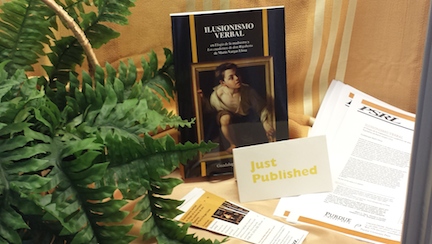Ilusionismo verbal en Elogio de la madrastra y Los cuadernos de don Rigoberto de Mario Vargas Llosa
Guadalupe Martí-Peña
Among the multiple approaches to be taken on an author as multifaceted and prolific as the recent Nobel Laureate Peruvian writer Mario Vargas Llosa, Guadalupe Martí-Peña has chosen to look at the novelist as an illusionist. She studies this land of fantasies and daydreams, that seemingly harmless battlefield where literature, theater, and painting contend and join together with the writer, the dreamer, and the illusionist to oust reality. Focusing on Elogio de la madrastra and Los cuadernos de don Rigoberto, and the effect of illusion on the reading process, she argues that by referring to theatrical, pictorial, and mystical patterns Vargas Llosa entices us to experience, along with his characters, the unreal as real, the dream as reality, the magic of fiction as an empowering act.
The book looks first at the theatricality and theatrics that enliven both texts. In the light of reader/spectator-response theories and theater semiotics, Martí-Peña shows how the novelist turns narrating into acting, fiction into performance, and reading into seeing. She next reflects upon the role that painting plays in the materialization of the characters’ desires and illusions. By funneling pictorial aesthetics through the prism of narration, and by engaging with theory concerned with issues of text-image inter-relations, she examines the various functions paintings play within the linguistic system. Finally, she compares Rigoberto’s writing exercises to the writings of self-examination described by Michel Foucault in “L’écriture de soi.” Both texts encapsulate the main active ingredient in all of Vargas Llosa’s writings: that fiction is not a submission to life but rather an insurrection against it. Verbal illusionism becomes the most efficient tactic to carry out such a rebellion.
“This study is a guidebook to a vast amount of criticism about and related to Vargas Llosa’s novels Elogio de la madrastra and Los cuadernos de don Rigoberto, and it is very enjoyable (as well as informative) to read. The author discusses the complexity and the many layers of these novels in very appealing and intelligible ways.” —Mary G. Berg, Women’s Studies Research Center, Brandeis University
Guadalupe Martí-Peña, The Pennsylvania State University (University Park), currently teaches courses in Spanish-American Contemporary Narrative and Cultural/Literary Critical Theory. Her research interests include Spanish American writers whose intertextual writings bridge the gap between high and low cultural practices (especially Manuel Puig and Mario Vargas Llosa), as well Inter-Art Discourses and Detective Fiction. She published the first comprehensive annotated bibliography on Puig’s criticism, which led to her collaboration in the critical edition of El beso de la mujer araña under the direction of Argentine critics José Amícola and Jorge Panesi. She has also collaborated in two monographic works on Vargas Llosa and Puig (Mario Vargas Llosa: perspectivas críticas and El mundo femenino en la obra de Manuel Puig). She is the author of several articles in such journals as Bulletin of Hispanic Studies, The Journal of Iberian and Latin American Studies, Romance Notes, Revista Iberoamericana, Revista Canadiense de Estudios Hispánicos, Hispamérica and Chasqui.
PSRL 61. Paperback, XII, 351 pp. 24 illus. 978-1-55753-690-7 • E-Book available. In Spanish.


Display case in Stanley Coulter Hall week of September 10-17, 2014.